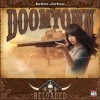profile badges
recent achievements

I Own a Game!
Mark a game that you own by clicking the "Own It" button on a game page.
Mark a game that you own by clicking the "Own It" button on a game page.

I Am What I Am
Select a gamer type in your profile
Select a gamer type in your profile

Show others what games you like best. Navigate to a game page and click on the "Favorite" button.

Doomtown: Reloaded - Base Set
Doomtown: Reloaded is an expandable card game that is a reboot of an older collectible card game Deadlands. At a fundamental level, the objective of the game is board control. In the most basic sense the more board control you have at the end of a round, the more your chances of winning.
The game is split into a number of “Days” or rounds, each day is split up into different phases:
1. Gambling Phase – a round of lowball poker to decide which player plays first for the rest of that day
2. Upkeep Phase – this phase consists earning ghost rock from your deeds and spending them to keep your dudes in play
3. High Noon – This is the main phase of the game, where players can move their dudes around the board, play actions, spells, gadgets, goods and deeds. High noon is also the time in the game when shootouts can occur.
4. Sundown Phase – This is the last phase where the players determine how much influence and control they have on the board.
5. At the end of the sundown phase, if one player has more control than any other player has influence, they are the winner. If not, then another day begins.
The base set comes with four “outfits” and the expansions let you add other outfits to your card set. Each outfit plays differently and have different sets of abilities that give them a distinct advantage when playing. The game has different types of cards like dudes, goods, actions, spells, gadgets and deeds. Deeds are properties which you can place to gain control points.
The primary currency in the game is called “Ghost Rock”, it is what you pay to have dudes come into play and to keep them there. Ghost rock can be earned by acing dudes with bounties on them and during the upkeep phase based on the number of deeds you control.
Shootouts are the game’s battle system using which you can try to get rid of the opposing player’s dudes. The reason I use the word “try” is because to win a shootout you basically have to win at poker. Each card in the deck has a playing card suite and value attached to it which is used in shootouts to determine the rank of your hand. Doomtown follows the traditional poker model for hands and adds one special hand of its own. The difference between the ranks of the players’ hands determines how many “casualties” the losing player takes. A turn can have as many shootouts as the players want, there is no limit. Jobs similar to shootouts except that the objective of a job is not to kill someone and you can initiate a job only if you have that job card in your deck.
Deck building in Doomtown requires the player to consider multiple aspects of a card: its initial cost, upkeep, suite and value, number of bullets a dude has, whether a dude is a stud, the dude’s influence. As you can see, with so many intricacies involved in the selection of a card, there is a high possibility for players to develop a unique play style. The unpredictability of playing spells and gadgets also lends to the dynamic nature of the game. In a way similar to Dungeons and Dragons where outcomes of actions are determined through a dice roll, the outcome of a spell or gadget is determined by the value of a card drawn from the top of your deck. Shootouts to me standout as the most engaging element of the game, no matter how calculated your play maybe, no matter how strong your dude may be, there is still a chance that you can end up with a pathetic hand and lose the shootout; the opposite is also equally true. You can obviously stack your deck to give you good hands but the cheating mechanic ensures that you cannot exploit that aspect of the game.
Doomtown’s convoluted set of rules will turn away many, but those who manage to climb that initial steep learning mountain will find a deep and satisfying game with enough freedom to create new types of play within the given ruleset. The game also scales to 3,4 and even 5 players. Though you might need to set aside more than a couple of hours if you are playing with more than 3 people. The creators have tried their best to explain all the rules in the rulebook and the learn to play book, this game still takes at least 3 play sessions to get acquainted with. If this game is not for you and you end up not liking the game, you at least have a flashy pack of cards to play poker with.